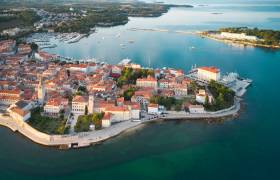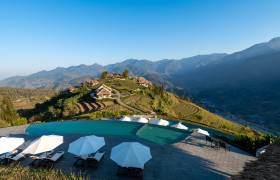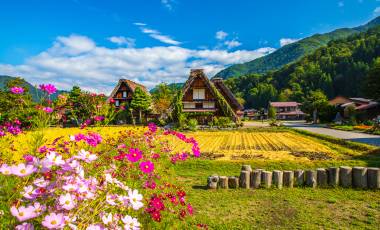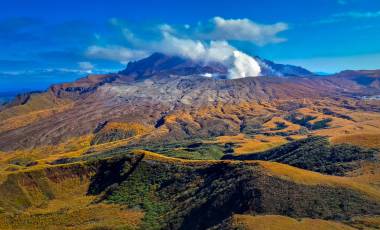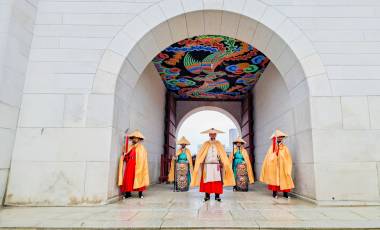
Takayama Tales: This Small Mountain City Reveals the Real Japan, According to Our Expert Local Guide
When you meet Exodus tour leader Hidesada Shimazaki, there’s a calm about him. He speaks softly, often pausing to think before he answers, not out of hesitation, but because in Japan, silence is part of the conversation.
When asked what he loves most about leading our Ancient & Modern Japan trip, he says simply, “The contrast.”
And yet, he isn’t talking only about the obvious, the glass towers of Tokyo against Kyoto’s temple roofs, but about the way old and new move together in perfect rhythm.
That rhythm, he believes, is most alive in Takayama. High in the Japanese Alps, this small mountain city captures the essence of what makes Japan feel timeless.

For us, including Takayama on our Ancient & Modern Japan trip is no accident. As Japan’s most famous sights grow busier, with even a Mount Fuji viewpoint screened off after locals grew frustrated by overcrowding and litter, this remote mountain city stands as a reminder that the country’s true character endures far from the main trail. Here, heritage isn’t curated, it’s lived.
The pace slows, the air smells of cedar, and narrow streets are lined with merchant houses that have stood for centuries.
“In Takayama, you can breathe again… It’s the Japan people dream about. ”
On this trip, he gets the chance to lead travellers through the Miyagawa Morning Market, one of Japan’s oldest, where stallholders have sold miso, mountain vegetables and handmade pickles for generations. The market dates back more than 300 years, and much like the town itself, it has resisted the pull of modernisation.

“You can still see local people buying food for the day,” he says. “That’s rare in Japan now.”
Elderly women arrange wildflowers beside jars of fermented radish; a man roasts Hida beef skewers over glowing coals.
Hidesada greets them, easily translating jokes that bridge languages. “When I bring guests, they tell stories, share tastes. It’s not a performance, it’s everyday living.”
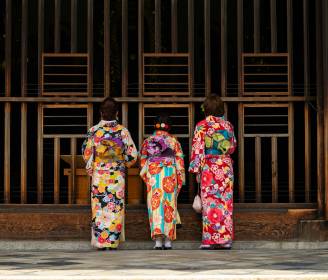
Ancient & Modern Japan
Explore Zen gardens, temples and the most iconic sights of Japan
Nearby, along the old merchant quarter of Sanmachi Suji, the Edo-period houses lean gently towards each other like old friends. Their dark-lacquered facades hide tiny courtyards and sake breweries, where visitors are welcomed with a sip of clear, fragrant rice wine.
“This is one of my favourite walks,” Hidesada says. “People taste sake, talk with the brewers, and see how families have kept the same work for hundreds of years.”
He often takes his group to one of the small soy or miso workshops, too, where tall wooden barrels still bubble with decades of seasoning.
For him, these encounters, small, unscripted and human, reveal more about Japan than any postcard view.
“This is why Takayama matters. In big cities, old traditions sometimes become attractions. But here, people keep doing what their parents and grandparents did, not for tourists, but because it’s their way of life ”

Takayama’s slower pace also allows him to show another side of Japanese life: its quiet devotion to craft. In the Hida Folk Village, his groups wander among traditional thatched houses relocated from the surrounding mountains.
“You can see how people adapted to the mountains,” he says. “Steep roofs for snow, wide beams for warmth, everything made by hand.”
For Hidesada, guiding here is less about instruction than observation. “I want guests to notice how small details connect to bigger ideas, how Japan’s beauty comes from balance.”
Guiding, for Hidesada, is about noticing. It’s why, even after 16 years, he still delights in teaching travellers the subtleties of Japanese etiquette; : how to bow lightly, how to accept a gift with both hands, how to order politely in a restaurant.
Every day he teaches a new phrase: “kudasai” (please), “hajimemashite” (nice to meet you), “oishii desu” (it’s delicious).
“By the end of the trip, they can use about 10,” he laughs. “And when they say them to local people, they always get a smile back.”
It’s that spirit of connection that shapes our Ancient & Modern Japan adventure from start to finish.

In Kyoto, the trip begins amid temple bells and quiet gardens. Kinkaku-ji, the Golden Pavilion, is an important reminder of a time when shoguns ruled and art flourished.
“It’s a Buddhist temple,” Hidesada tells his guests, “but it was built by a shogun, which is why it looks so rich.”
At Ryoan-ji, he encourages them to pause before the famous rock garden, to listen to the stillness. “If it’s not crowded, I ask them to close their eyes,” he says. “That’s the sound of Zen.”

In Nara, the tone shifts from meditative to playful as travellers meet the sacred deer that bow for rice crackers.
“It’s fun,” he grins. “It reminds people that spirituality can be joyful too.”

Ancient & Modern Japan
Explore Zen gardens, temples and the most iconic sights of Japan
He then leads them away from the crowds at Todai-ji’s Great Buddha, along a lesser-known path lined with mossy lanterns to Kasuga Taisha Shrine. “It’s calmer there,” he says. “That’s the Japan I like to show: quiet, thoughtful, still connected to nature.”
But Takayama, tucked into the northern ranges of Gifu Prefecture, remains his touchstone. It’s here that the adventure shifts from the grand and ceremonial to the intimate and personal.
When a typhoon once hit during a visit, he had to adjust the schedule entirely. “We stayed an extra day,” he recalls. “But we still managed to see everything. That’s what guiding is, finding solutions and keeping everyone happy.”
His calm assurance turned a weather delay into one of his group’s most memorable experiences.
Evenings in Takayama are simple and warm. Groups often dine together on Hida-gyu, ( the local beef famed for its marbling), grilled at small family-run restaurants or enjoyed as sukiyaki simmered at the table. While in the summer, groups share ice cream.
“We talk, laugh, and relax,” Hidesada says. “People start to feel like friends.”

That camaraderie continues as the journey moves south again, through Kanazawa’s samurai streets and into Hiroshima.
In Hiroshima, food once again becomes a bridge to understanding. At Okonomimura, a lively multi-storey building of open-grill restaurants, travellers watch chefs cook okonomiyaki, Hiroshima’s signature savoury pancake, layer by layer: noodles, cabbage, batter, sauce, a glint of mayonnaise.
“It’s fun to see how they make it right in front of you,” he says. But it’s what comes after dinner that stays longest in the memory.
Before the group travels to Hiroshima’s Peace Memorial Park, Hidesada often leads a quiet origami lesson, while in Kyoto, he teaches guests to fold paper cranes, symbols of peace and remembrance.
He collects each one and ties them together into a colourful chain, which they carry with them to Hiroshima.

“My guests like to donate our cranes at the Children’s Peace Monument,” he says. “They find it very moving. For me, it’s a way to explain how Japanese people think about peace, not through speeches, but through action.”
Standing before the statue of Sadako Sasaki, surrounded by thousands of cranes from around the world, the group always falls silent.
The following day, on nearby Miyajima Island, Hidesada aims to time his visits to the floating torii gate with the tide.
“It’s beautiful at high tide,” he says, “but when the water goes out, you can walk right up to it. Either way, it’s special.”
For him, the balance of planning and spontaneity is the essence of good guiding: knowing when to follow the schedule and when to let the moment lead.

Ancient & Modern Japan
Explore Zen gardens, temples and the most iconic sights of Japan
By the time the journey returns to Tokyo, travellers have seen a Japan of many faces: the discipline of city life, the serenity of shrines, the warmth of mountain towns. Yet what they remember most, Hidesada believes, are the small details: the market vendor’s smile, the sun dappled on the temples, the sound of a train door sliding open precisely on time.
“We have four clear seasons,” he says. “They shape our food, our art, even our feelings.” In autumn, he introduces guests to momijigari, the tradition of ‘hunting’ for crimson maple leaves, from Kyoto’s gardens to the slopes around Lake Kawaguchi, where Mount Fuji glows in the distance.
“When the mountain finally appears,” he teases, “I tell them: ‘we say when you behave well, the weather is good. So thank you for your good behaviour’.”
After more than 15 years as an expert local guide, Hidesada still carries the same quiet pride he felt on his first tour, perhaps because he’s never stopped seeing Japan through his travellers’ eyes.
For him, guiding is as much about discovery as teaching. “Every group is different,” he says. “They ask new questions, so I’m always learning too.”
When he talks about his homeland, there’s no performance, just affection. He doesn’t dwell on monuments or lists of must-sees; he speaks of light on temple roofs, the taste of freshly grilled skewers, the sound of wind through cedar.

For him, Takayama remains the heart of it all, a place that moves at its own pace, honouring its traditions without needing to display them.
“Takayama is where you feel time slow down,” he says softly. “That’s the Japan I want people to remember.”
From the stillness of Zen gardens to the towering skyscrapers, Hidesada Shimazaki reveals a Japan that lives not in contrast, but in harmony, a country that’s ancient, modern, and endlessly alive.




